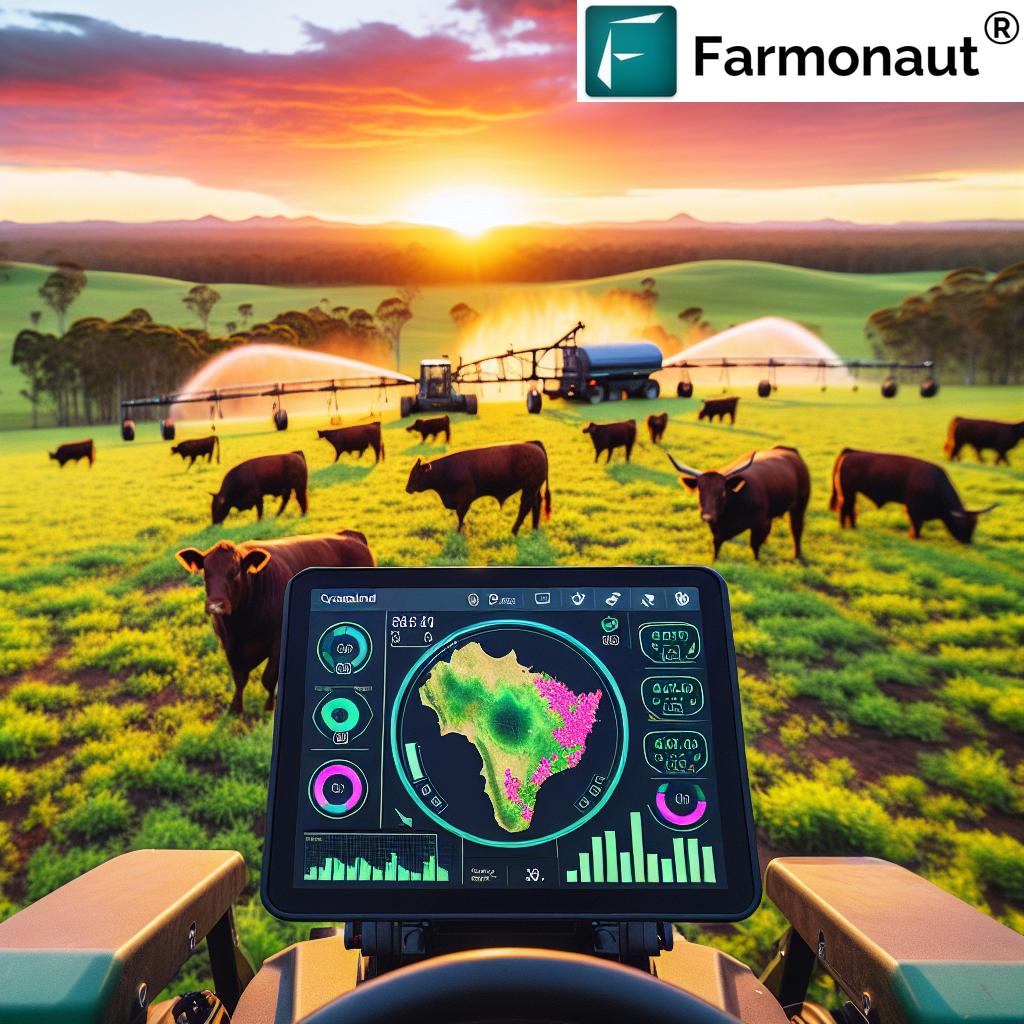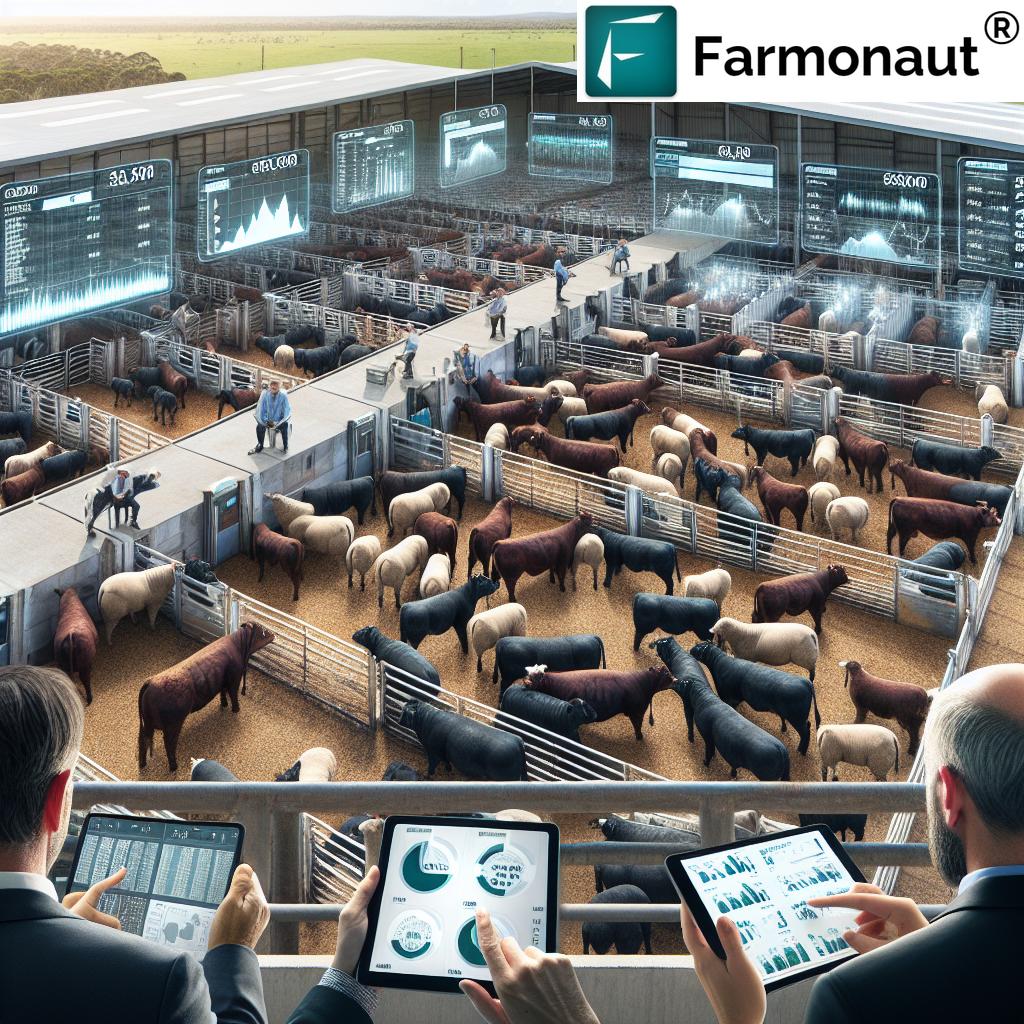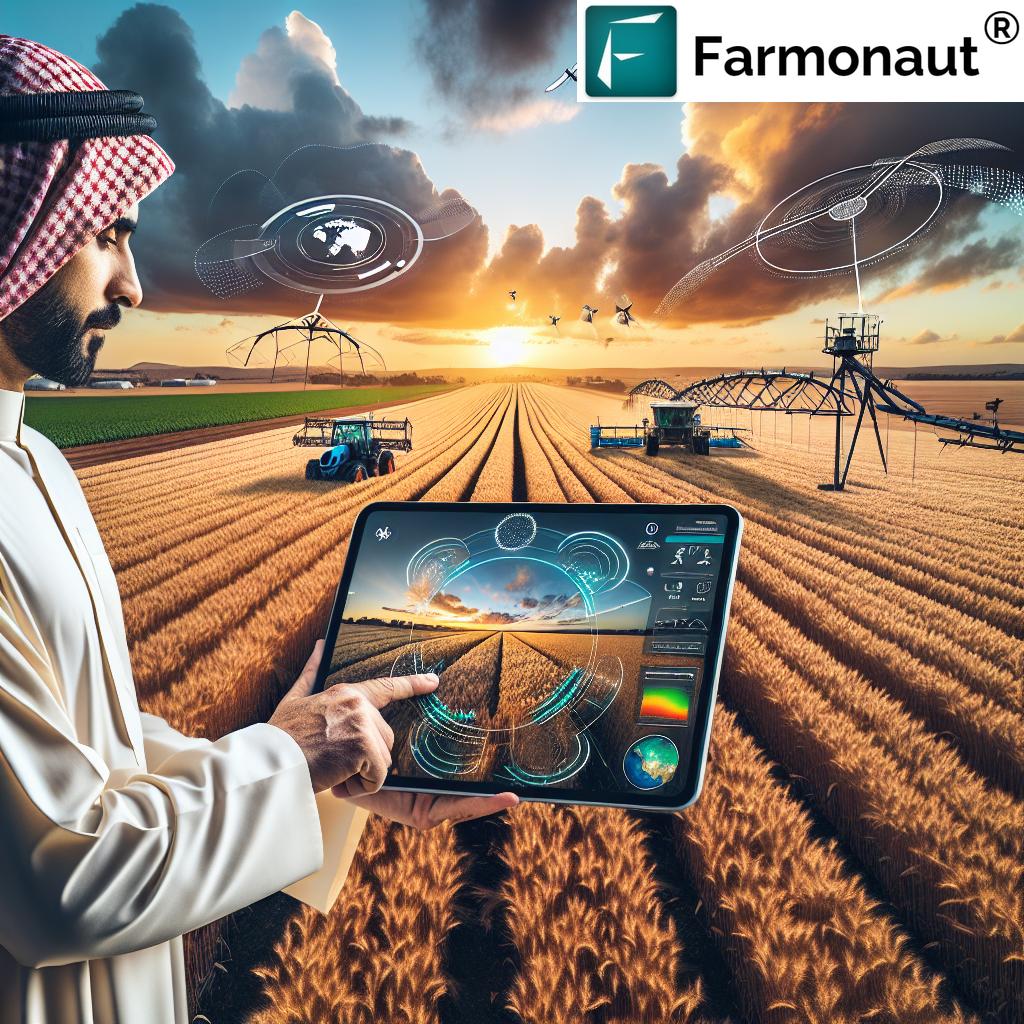Revolutionizing Queensland’s Pastoral Industry: Digital Solutions for Sustainable Grazing and Livestock Management
“Queensland farmers using precision farming techniques have seen up to 30% increase in crop yields.”
Welcome to our comprehensive exploration of how agricultural technology solutions are transforming the livestock management and sustainable grazing practices in Queensland and beyond. As we delve into this exciting realm of digital innovation in farming, we’ll uncover the latest trends and technologies that are reshaping the pastoral landscape of the Sunshine State.
The Digital Revolution in Queensland’s Pastoral Industry
In recent years, we’ve witnessed a remarkable shift in the way Queensland’s pastoral industry operates. Traditional methods are being enhanced and, in some cases, replaced by cutting-edge digital solutions. These advancements are not just changing the face of farming; they’re revolutionizing it from the ground up.
Let’s explore how these innovations are impacting various aspects of pastoral operations:
- Sustainable grazing management
- Livestock health monitoring
- Crop yield optimization
- Soil fertility analysis
As we journey through these topics, we’ll see how farmers in regions like Tambo and Blackall are embracing these changes, and how they’re influencing everything from agricultural education to rural tourism.
Precision Farming Techniques: A Game-Changer for Queensland
Precision farming techniques are at the forefront of this agricultural revolution. By leveraging advanced technologies, farmers can now make data-driven decisions that optimize their operations like never before.

One of the key players in this transformation is Farmonaut, a company that’s making waves with its satellite-based farm management solutions. Their platform offers real-time crop health monitoring, AI-based advisory systems, and resource management tools that are changing the game for farmers across Queensland.
Here’s how precision farming is making a difference:
- Improved resource allocation: Farmers can now precisely determine where to apply water, fertilizers, and pesticides, reducing waste and environmental impact.
- Enhanced crop monitoring: Satellite imagery and AI algorithms allow for early detection of crop health issues, enabling timely interventions.
- Optimized livestock management: Advanced tracking systems help monitor animal health and grazing patterns, ensuring optimal herd management.
These technologies are not just improving efficiency; they’re also contributing to more sustainable farming practices. By reducing resource waste and optimizing land use, precision farming is helping Queensland’s pastoral industry become more environmentally friendly.
Remote Sensing in Agriculture: Seeing the Big Picture
Remote sensing technology has emerged as a powerful tool in modern agriculture, particularly in vast pastoral regions like Queensland. This technology allows farmers to gather crucial data about their land and crops without physically visiting every corner of their property.
Here’s how remote sensing is revolutionizing agriculture in Queensland:
- Crop health assessment: Multispectral imaging can detect plant stress before it’s visible to the naked eye, allowing for early intervention.
- Soil moisture monitoring: Satellite data can provide insights into soil moisture levels, helping farmers make informed irrigation decisions.
- Land use mapping: Remote sensing helps in creating accurate maps of land use, which is crucial for large-scale pastoral operations.
Companies like Farmonaut are at the forefront of this technology, offering farmers easy access to satellite imagery and analysis through their  and mobile applications.
and mobile applications.
Smart Irrigation Systems: Quenching the Thirst Efficiently
Water management is a critical concern in Queensland’s often drought-prone climate. Smart irrigation systems are addressing this challenge head-on, offering precision and efficiency in water use.
Key benefits of smart irrigation include:
- Water conservation: These systems use weather data and soil moisture sensors to apply water only when and where it’s needed.
- Improved crop health: By providing optimal water levels, smart irrigation helps maintain ideal growing conditions for crops.
- Cost savings: Efficient water use translates to lower operational costs for farmers.
Farmers in regions like Roma and North Queensland are seeing significant improvements in their water management strategies thanks to these innovative systems.
Livestock Health Monitoring: Keeping Herds Healthy
In the pastoral industry, the health of livestock is paramount. Digital solutions are now playing a crucial role in monitoring and maintaining animal health across Queensland’s vast grazing lands.
“Agricultural data analytics have improved Angus stud auction outcomes by 25% in some Queensland regions.”
Advanced technologies being employed include:
- Wearable devices: These track animal movements, body temperature, and other vital signs.
- AI-powered health prediction: Algorithms analyze data to predict potential health issues before they become serious.
- Automated feeding systems: These ensure that livestock receive the right amount of nutrition based on their individual needs.
For Angus studs and Merino sheep farmers, these technologies are proving invaluable. They’re not only improving animal welfare but also enhancing the quality of livestock, which in turn leads to better auction outcomes and higher prices for quality stock.
Agricultural Data Analytics: Turning Information into Action
The power of data is transforming how decisions are made in Queensland’s pastoral industry. Agricultural data analytics is providing insights that were previously unimaginable, helping farmers make informed choices about every aspect of their operations.
Here’s how data analytics is making a difference:
- Market predictions: By analyzing trends, farmers can better predict market demands and adjust their production accordingly.
- Operational efficiency: Data on everything from fuel usage to labor costs helps optimize farm operations.
- Yield forecasting: Advanced analytics can predict crop yields with increasing accuracy, helping farmers plan their harvests and sales strategies.
Platforms like Farmonaut’s API are making it easier for farmers to access and utilize this valuable data. The API Developer Docs provide a wealth of information for those looking to integrate these powerful tools into their own systems.
Digital Farm Management: Bringing It All Together
Digital farm management systems are the central hub where all these technologies converge. These platforms provide a holistic view of farm operations, allowing farmers to manage everything from a single interface.

Key features of digital farm management systems include:
- Integrated dashboard: Provides a comprehensive overview of all farm activities.
- Task management: Helps schedule and track farm tasks efficiently.
- Financial tracking: Monitors expenses and revenues, aiding in financial planning.
- Compliance management: Assists in meeting regulatory requirements and maintaining records.
Farmonaut’s suite of tools, accessible through their  and
and  , exemplifies how these systems are making farm management more accessible and efficient than ever before.
, exemplifies how these systems are making farm management more accessible and efficient than ever before.
Impact on Queensland’s Pastoral Regions
The adoption of these digital solutions is having a profound impact on Queensland’s pastoral regions. Let’s take a closer look at how specific areas are benefiting:
Tambo and Blackall: Pioneering Digital Adoption
These regions in Central West Queensland are seeing significant improvements in their pastoral operations:
- Enhanced grazing management: Digital tools are helping farmers in Tambo and Blackall optimize their grazing rotations, leading to better pasture health and livestock productivity.
- Improved water efficiency: Smart irrigation systems are particularly beneficial in these drought-prone areas, ensuring every drop of water is used effectively.
- Better livestock tracking: Digital solutions are making it easier for farmers to monitor their cattle across vast properties, improving herd management and reducing losses.
Roma: Transforming Livestock Auctions
Roma, known for its significant livestock sales, is experiencing a digital revolution in its auction processes:
- Data-driven pricing: Agricultural data analytics are helping set more accurate and competitive prices for livestock.
- Virtual auctions: Digital platforms are enabling buyers from across the country to participate in Roma’s auctions, expanding the market reach.
- Improved buyer information: Detailed digital records of animal health and genetics are providing buyers with more comprehensive information, leading to better-informed purchases.
North Queensland: Adapting to Tropical Challenges
The unique climate of North Queensland presents its own set of challenges, which digital solutions are helping to address:
- Weather monitoring: Advanced weather prediction tools are crucial in this region prone to cyclones and heavy rainfall.
- Pest and disease management: Digital monitoring systems help detect and manage tropical pests and diseases more effectively.
- Soil health optimization: Precision farming techniques are particularly beneficial in managing the diverse soil types found in this region.
The Future of Queensland’s Pastoral Industry
As we look to the future, it’s clear that the integration of digital solutions in Queensland’s pastoral industry is just beginning. Here are some trends we expect to see in the coming years:
- Increased automation: From robotic milking systems to autonomous tractors, we’ll likely see more tasks being automated on Queensland farms.
- AI-driven decision making: Artificial Intelligence will play an increasingly important role in analyzing complex data sets and providing actionable insights to farmers.
- Blockchain for traceability: Technologies like those offered by Farmonaut will become more prevalent, ensuring transparency and traceability in the supply chain.
- Sustainable farming practices: Digital solutions will continue to drive more sustainable practices, helping Queensland’s pastoral industry reduce its environmental footprint.
Impact on Agricultural Education and Rural Tourism
The digital revolution in Queensland’s pastoral industry is not just affecting farming practices; it’s also having a significant impact on agricultural education and rural tourism.
Transforming Agricultural Education
Educational institutions across Queensland are adapting their curricula to include these new digital technologies:
- Updated course offerings: Universities and vocational schools are introducing courses on precision agriculture, data analytics, and digital farm management.
- Hands-on experience: Students are getting practical experience with the latest farming technologies, preparing them for the future of agriculture.
- Research opportunities: The influx of data from digital farming practices is opening up new avenues for agricultural research.
Boosting Rural Tourism
The adoption of digital solutions is also creating new opportunities for rural tourism in Queensland:
- Tech-savvy farm tours: Visitors can now experience how modern farms operate, seeing firsthand how technology is transforming agriculture.
- Educational experiences: Agri-tourism operations are incorporating digital elements to provide interactive and informative experiences for visitors.
- Sustainable tourism: The focus on sustainability driven by digital solutions is attracting eco-conscious tourists to rural Queensland.
Digital Solutions Impact on Queensland’s Pastoral Industry
| Digital Solution | Traditional Method | Benefits | Adoption Rate (%) |
|---|---|---|---|
| Remote Sensing | Manual field inspection | Early detection of crop issues, efficient resource allocation | 65 |
| Smart Irrigation Systems | Scheduled watering | Water conservation, improved crop health | 50 |
| Agricultural Data Analytics | Experience-based decision making | Data-driven insights, improved market predictions | 40 |
| Precision Farming Techniques | Uniform field management | Optimized inputs, increased yields | 55 |
Farmonaut: Pioneering Digital Solutions for Queensland’s Farmers
As we’ve explored the various digital solutions transforming Queensland’s pastoral industry, it’s clear that companies like Farmonaut are playing a crucial role in this revolution. Their comprehensive suite of tools is helping farmers across the state embrace the future of agriculture.
Farmonaut’s offerings include:
- Satellite-Based Crop Health Monitoring: Providing real-time insights into vegetation health and soil moisture levels.
- Jeevn AI Advisory System: Delivering personalized farm advice based on AI analysis of satellite data and other inputs.
- Blockchain-Based Product Traceability: Ensuring transparency and security in agricultural supply chains.
- Fleet and Resource Management: Optimizing the use of agricultural machinery and resources.
- Carbon Footprinting: Helping agribusinesses monitor and reduce their environmental impact.
For Queensland farmers looking to embrace these cutting-edge technologies, Farmonaut offers flexible subscription options to suit operations of all sizes:
Frequently Asked Questions
Q: How are digital solutions improving livestock management in Queensland?
A: Digital solutions are enhancing livestock management through advanced health monitoring systems, optimized grazing patterns based on satellite data, and improved auction outcomes through data analytics.
Q: What impact are precision farming techniques having on crop yields in Queensland?
A: Precision farming techniques have led to significant improvements in crop yields, with some Queensland farmers reporting up to a 30% increase in productivity.
Q: How is remote sensing technology benefiting pastoral operations in Queensland?
A: Remote sensing technology is providing farmers with valuable insights into crop health, soil moisture levels, and land use patterns, enabling more informed decision-making and efficient resource allocation.
Q: What role does Farmonaut play in Queensland’s agricultural technology landscape?
A: Farmonaut offers a comprehensive suite of digital farm management tools, including satellite-based crop monitoring, AI advisory systems, and blockchain-based traceability solutions, helping Queensland farmers embrace cutting-edge agricultural technologies.
Q: How are digital solutions influencing agricultural education in Queensland?
A: Educational institutions in Queensland are updating their curricula to include courses on precision agriculture, data analytics, and digital farm management, preparing the next generation of farmers for a technology-driven future.
Conclusion: Embracing the Digital Future of Queensland’s Pastoral Industry
As we’ve explored throughout this article, the digital revolution is fundamentally transforming Queensland’s pastoral industry. From the vast grazing lands of Tambo and Blackall to the bustling livestock markets of Roma, technology is reshaping every aspect of farming and livestock management.
The adoption of precision farming techniques, remote sensing technologies, smart irrigation systems, and advanced data analytics is not just improving efficiency and productivity; it’s also paving the way for more sustainable and environmentally friendly farming practices. Companies like Farmonaut are at the forefront of this transformation, providing farmers with the tools they need to thrive in this new digital landscape.
As we look to the future, it’s clear that the integration of these digital solutions will continue to accelerate. For Queensland’s farmers, embracing these technologies isn’t just an option – it’s becoming a necessity to remain competitive in an increasingly global and technology-driven agricultural market.
The digital revolution in Queensland’s pastoral industry is more than just a trend; it’s a fundamental shift in how we approach farming and livestock management. By embracing these innovations, Queensland’s farmers are not only securing their own futures but also contributing to a more sustainable and productive agricultural sector for generations to come.













